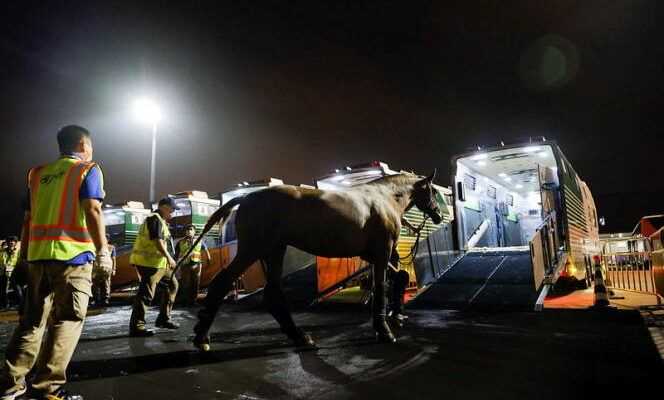In many ways, the trip to Tokyo is like an odyssey for the protagonists of the Olympic Games. Tests, quarantine, contact with the outside world prohibited, and even geolocation. Athletes, members of delegations, journalists: all must submit to very strict conditions for the event. All of them, including the particular “athletes” that are the Olympic horses.
Within the French Equestrian Federation (FFE), the mission of coordinating the departure of the French team fell to Sophie Dubourg. The national technical director, chief of mission for the Olympic Games, underlines “A much greater logistical challenge” that during the last editions, in London (2012) and Rio (2016): “It’s always complicated to get horses to travel, so in times of a pandemic, these problems multiply. Planning has been disrupted by constant administrative changes, huge number of forms to fill out, stricter sanitary conditions on the Asian continent, she sums up. These are by far the most difficult Games to prepare. “
This logistical challenge also presented itself to another delegation with bulky competition equipment. At the beginning of May, the director of the French sailing team, Guillaume Chiellino, who oversees all the Olympic qualifiers, buckled the containers sent to Japan. “You have to be really careful when boarding the boats, because their journey is long, and absolutely nothing should happen to them. “ Difficult to replace at short notice and as quickly as possible a boat carefully tuned to respect the protocols …
Personalized preparation for horses
For the “sailors”, the health crisis has not radically changed the situation when it comes to transporting their equipment to the other side of the world. “Covid or not, you have to do it really in advance, because they travel in container ships, in boxes that we have meticulously arranged. We just hope that everything will go well, and that their transport will not be blocked in the Suez Canal ”, where global maritime traffic came to a standstill in March.
Manon Audinet, French skipper who forms a mixed pair with Quentin Lapierre in Nacra 17, says: “We put the boat in the container in April, and we found it when we arrived. Until the test, we will probably have to make some changes to it, and that will take a little time. It’s really important to be able to sail the boat again, [de] reclaim it, [d’]be sure that it is in our hands and that it has traveled well. ” A spare boat is also sent in the event of a problem.
The time has come for us to fly to Japan … ??? #ourdreamcomestrue !! This Monday 12th, we will ask n… https://t.co/pfvTFyPUe5
– DelapAudinet17 (@Delapierre & Audinet – Tokyo 2020 – Nacra 17)
For four-legged athletes, the journey also began long before the Games. Quarantine before departure was imposed on them (during which they underwent numerous health checks), and training has been adapted since the beginning of the year: personalized stress tests are carried out and allow to adapt training.
Before the start of the Olympic Games, the European horses are gathered in Liège, the rallying point for the European teams. And the examinations continue: the papers are checked by the authorities of the Ministry of Agriculture, in conjunction with their Japanese counterpart. Then a nineteen-hour journey awaits them, with a stopover in Dubai, without the horses getting off the plane. The quadrupeds travel in pairs per box and are extremely supervised on board this cargo plane, by veterinarians and by grooms (responsible for the preparation of sport horses, care, warm-up and recovery, transport ). Upon arrival, the horses are transported directly to the Baji Koen Equestrian Park in Tokyo, where the equines and the teams prepare and compete in the competitions.
Touch down in Tokyo Town! ?? https://t.co/qLHw6TEvQm
Countering isolation on site
If the logistics posed difficulties upstream, the conditions are no less harsh once there. These Games, which will be held for the first time in history behind closed doors, will therefore be played without spectators and without the relatives of the participants. The delegation did not even have the leisure to get to know each other or to meet, as had been the case on the sidelines of Rio. “We are doing it virtually and hope it won’t hurt the athletes”, advances Sophie Dubourg.
She continues: “We operate as a team, even though it’s not a team sport. And cohesion can be worked on. There is a paramedical staff, with farrier, physiotherapist, doctor and veterinarian, a staff for each discipline, as well as the grooms and [les] riders. It has to match. “
A few days before the kick-off, mental preparation therefore takes on more scope in order to manage a situation of psychological stress due to estrangement and quarantine. Calming exercises are prepared for athletes: “Everything is done to keep them in their athletic bubble”, explains the DTN. A bubble that they hope to leave as in Rio five years ago: decorated with medals.
